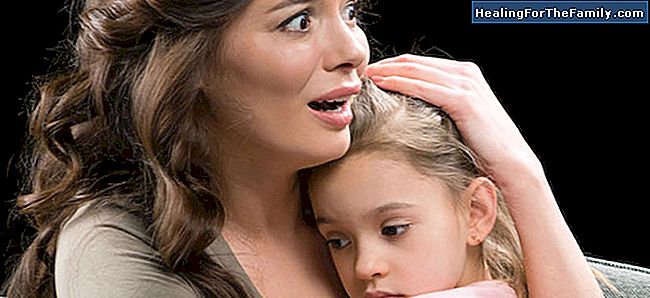Fears that parents spread to children
Are children scared and frightened from birth? Or are there fears that are learned? It is not the same a cautious child, who pays attention and care in what he does, than a scared or frightened child. That children are afraid of the dark, of monsters, of being left alone, of strangers ... it is norm
Are children scared and frightened from birth? Or are there fears that are learned? It is not the same a cautious child, who pays attention and care in what he does, than a scared or frightened child.
That children are afraid of the dark, of monsters, of being left alone, of strangers ... it is normal at certain ages and each evolutionary stage also has different fears associated with it. Fear is a primary emotion, it is evolutionary and it helps us to protect ourselves from the dangers. But, qué what happens to those fears that parents infect children? Fears learned, when the child assumes the fears of the parents
We must take care of how we handle the fears of the children, since we can reinforce them without realizing it and make that fear go further and end up generalizing, which will lead to more complex situations of anxiety.

Sometimes children are too scared or scared. Fear of going to the bathroom alone, fear of playing with other children, fear of swings, etc ... And these fears may be contagious or learned. These learned fears also affect your self-esteem. But, a what do we mean by learned fears?
An example. Our son is in the park, he is small, and we observe him from the bank. Suddenly the child gets up and goes to the slide that is next, and climbs. We get scared and running we go for him, with a panic, we take him and tell him, Honey, be careful, it's dangerous! And at that moment ... the boy has just learned two things: - The slide is dangerous, he does not know very well why, but if his mother considers it, it will be able to hurt him.
- It's dangerous and I can not face him, (because I'm not capable, mom has come to save me so it will be that I can not face that problem).
The fearful child is an insecure child, so when teaching him the fear of something, in addition, I convey that I do not trust him to face that obstacle. It affects your self-esteem.
It is normal and natural that I want to protect my son from the dangers that surround him, but I can not always protect him, and it is not good. The child has to explore, he has to stumble and he has to fall, he has to hurt himself and he has to cry, but most importantly, he has to learn to get up. If I transmit the feeling that the world is dangerous, hostile, full of bad people who can hurt me, and that besides, he can not only face the dangers, and that he needs us continuously,
he is very likely not to dare to do many things
, (go down for bread, buy some sweets, order a soda in a cafeteria ...). That is, it limits you. Not only do we transmit that insecurity and that fear with what we say, non-verbal communication is also important.If the child feels that I am nervous, if he notices my fear ... he will also have it, even if he does not say anything.
Children also learn fear by observation. At other times we transmit our own fears, (to the dogs, to the heights, to the dentist, to the needles, to go alone to some place ...) and there we will have to make the double effort, control my fear and try not to transmit it to my son. That is why it is important for parents to control the fear that our children may be harmed, that something may happen to them, while demonstrating that we care for them and teaching them to be cautious and careful. Even if I'm scared to climb on the highest slide, even if I panic to fall,
what I have to convey is that I trust him, and if he falls
, I will be there, but without fear, to help him and support him. Tips not to spread fears to childrenTherefore some questions or advice:
- Although fear protects us,
Generalized fear does not mean being more cautious.
- If your child is very scared, just think, how am I doing? - If I am afraid of something, my son will surely have it too.
- Show your child that you trust him,
that he can do things alone, that he is brave and capable. Tell him: Honey I am with you, I look at you, do not worry that I am here, and avoid: Be careful, you will fall and you will hurt yourself, it is dangerous. Ante - When faced with a complicated situation (a fall or a fright in the street),
try to stay calm and do not lose your temper , because if the child has not noticed the situation or has not been harmed, before your reaction you will be frightened and what was not important now is and besides it is scary.
- Teach him to be prudent. Tell him: do not talk to strangers, if someone approaches you, do not listen to him or tell anybody else, and avoid phrases like: If someone approaches you, there are many bad people. Tra - Try not to reinforce your fearsmaking them avoid those situations that scare them, but do not underestimate them. If your child is afraid of the dark, do not let him sleep with everything turned on, but leave a little light, for example.












